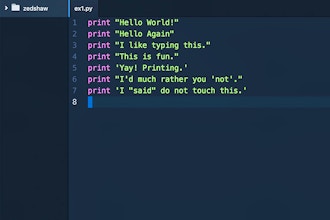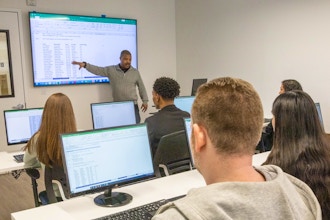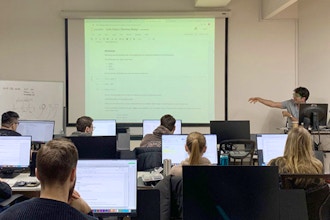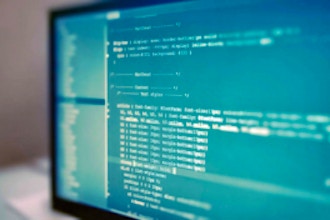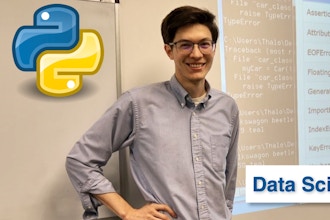Discover the Best Live Online Python Classes
As technology use increases, programming languages become crucial for every type of organization. Python holds the unique distinction of becoming one of the most popular programming languages in the world. Experts consider Python one of the easiest programming languages to learn, too, especially for those new to computer science.
Python is an object-oriented programming language (OOP), which means it organizes around objects (data) rather than functions (logic). That makes adding new data or functions easier than its opposite, procedural-oriented programming.
Learning Python can be essential for tech professionals in every sector, from Data Scientists to Software Engineers, Web Developers, and Financial Analysts. Even non-technical workers can benefit from learning Python fundamentals for tasks like automated email campaigns or getting data from an API.
Specializing in Python is quite lucrative. According to Indeed, Python Developers earn an average base salary of around $114,000 annually. Whether you want to work in data or development, consider Python a priority among programming languages you should know.
Why You Should Learn Python
If you are planning a tech career, Python should be on your priority list, whether you'll work in data science, web development, or business analysis. However, Python's wide-ranging applications extend far beyond technical jobs. Financial Advisors, Graphic Designers, and Administrative Assistants are a few of the roles that can benefit from using Python—whether for creating products or automating repetitive tasks.
To better understand Python's dominance among programming languages, consider the broad fields of data science and web development. Python has become the de facto favorite of many data science professionals for several reasons:
- Python is easier to learn than other languages for those without backgrounds in engineering
- Python's open-source status means it's free to download yet supported by a vast worldwide community
- The Pandas library makes data analysis easy for data science and professionals in other fields alike
On the development side, Python also proves highly popular. While Game Developers, Software Developers, and Web Developers typically need to know languages like C++ and Java, many benefit from using Python skills, too. These professionals can use Python to start a project quickly, and Python's flexibility allows them to transfer it to a different language if needed.
Of course, Back End Developers and those with the specific title of Python Developers use this popular programming language on a large scale. They need Python for software or web development and typically learn a range of related skills, like:
- Structured Query Language (SQL)
- Django
- Django REST
- Flask
- HTML
- CSS
- JavaScript
Back End Developers may need to learn Python as part of a broader development program, not as their only programming language. For many, PHP and Java will also be essential. However, it's unlikely that a back end development role will exclude Python. More likely, development pros will need to learn Python-based frameworks like Django and Flask along with Python itself.
Basic Python skills can still offer substantial value for those outside the tech sector. Although few people create computer games as a hobby, many office workers can use coding skills for everyday tasks. Consider the following examples.
Web scraping was once the province of programmers, but today's automation tools allow non-technical pros to extract data from websites. Because Python is easy to code, users can manage big tasks with a small amount of coding. Popular Python libraries like Beautiful Soup, Pandas, and Selenium simplify the process.
Data visualization is another area that can be essential for tech and non-technical pros alike. Whereas titles like Data Visualization Engineer or Data Visualization Developer make their requirements obvious, many other roles require visualization expertise. Business Intelligence (BI) Analysts, Project Managers, and Graphic Designers are a few positions where data visualization may be essential.
Not everyone who knows data visualization trains in Python. Some people learn tools like Power BI or Tableau in individual classes, while others learn data visualization tools as part of a broader Python-based curriculum.
Cybersecurity is another area where Python skills may be required. Cyber Analysts may use Python to create cyberattack prevention strategies, customize tools and automate tasks. Top libraries for cybersecurity include:
- Beautiful Soup
- Cryptography
- Faker
- Python-Nmap
- Pymetasploit3
- Scapy
- Scikit-learn
- Twisted
- YARA
If you have no coding experience, consider starting with Python. Many experts agree that Python is among the easiest programming languages to learn. If you have experience with popular programming languages like PHP, JavaScript, or C, consider adding Python to your skill set. Though you might not need it today, chances are good you'll need it in the future.
Python Development vs. Python Data Science
If you are considering making Python the focus of a tech career, your first task will be to decide whether you want to emphasize development or data science. The role of a Python Developer differs from that of a Data Scientist, and the training required differs, too.
Adding to the challenge, searching online job boards doesn't always make your decision-making process easy. You'll find hundreds of development and data science titles, many of which describe the same position. For example, what one company calls a Python Developer may be the same role that another company calls a Django Back End Developer.
Consider the following five categories to understand Python's role among data science and development professionals.
Web Development
Besides its role in data science, Python is best known for its popularity in web development. Back end development often calls for Python skills, and Python's ease of use allows developers to write code quickly. Companies ranging from startups to large multinationals have used Python to build their websites. Back End Developers typically learn Django, HTML, CSS, and SQL along with their Python education.
Software Development
With software development, Python is usually one among several languages essential for professionals. Depending on the role, a Software Developer may need Python, JavaScript, Ruby, and C/C+ to get the best opportunities.
Still, development pros can create prototypes in a short time frame using Python. Software Engineers and Full Stack Developers usually learn it alongside other languages like JavaScript and HTML/CSS and tools like MongoDB and React.
Game Development
While Python might not be the first thing you think of for gaming, its simplicity, and popularity, make it a good choice for basic game development. Check out the popular PyGame modules to learn more.
Data Science
Python data science is a field all its own, thanks to its popularity among Data Scientists, Data Analysts, and Machine Learning Engineers. These highly-skilled professionals may need to query databases, build machine learning models, and create visualizations. Python and related tools help them with all of it.
Top titles for data science professionals vary, so consider the following a small sample of possible roles:
- Data Architect
- Data Engineer
- Data Scientist
- Enterprise Architect
- Infrastructure Architect
- Machine Learning Engineer
- Machine Learning Scientist
- Research Scientist
While not widely considered separate from data science roles, data analysis can take tech professionals far afield in sectors like finance, marketing, and healthcare. Read on to learn more.
Data Analysis/Business Analysis (Business Intelligence/BI)
If your focus is more business than science, your Python skills may apply to data/business analysis. Search for these roles, and you'll find numerous titles like:
- Business Data Analyst
- Business Intelligence (BI) Analyst
- Credit Risk Analyst
- Data Analyst
- Data Analytics Developer
- Financial Analyst
- Python Data Analyst
These careers often require both Python skills and sector-specific training. Examples include fields like finance, healthcare, insurance, and marketing.
Learning Python for this type of role can look different from learning for a Data Scientist or Python Developer position. Some tech pros start with training in finance and trading topics like net present value (NPV) and internal rate of return (IRR), while others must focus on data visualization tools like Power BI and Tableau. Whatever your path, consider making Python an essential part of your technical training in any field.
How to Choose a Python Class
Your choice of Python training options will depend on how and where you plan to use what you learn in class. A Python fundamentals course may be sufficient for tech pros in computer graphics, system administration, or business analysis. Others will get Python training as part of a broader curriculum in areas like financial advisory services, cybersecurity, or healthcare.
By contrast, those who plan to work in data science or web or software development may need intensive Python training. For these professionals, an in-depth bootcamp or certificate program that features Python may be the best alternative. Many course providers combine Python training with a Python development or data science curriculum to prepare participants for entry-level positions in their chosen fields.
To narrow down Python training options, consider the following categories in order of the most basic introductory alternatives to the most comprehensive.
- Free Online Resources - Many tech pros start their Python educational journey through articles, blog posts, and short webinars or tutorials. Along with browsing job boards, these resources typically serve as introductions to the topic rather than in-depth training options.
- Self-Paced/On-Demand Courses - On-demand programs, also called self-paced programs, can offer introductory Python training beyond the scope of most free resources. A select few run long-term, but most are short classes. They may be available through a platform subscription or separately as paid programs, and sessions are prerecorded.
- Single Paid Classes - If your Python skills only make up a small part of your education, a single introductory class may be enough to meet your needs. Check out introductory Python class syllabi to see whether they provide enough knowledge and technical training. You might be better off with a bootcamp or certificate program which includes Python modules.
- Bootcamps - As more and more companies need workers with strong Python skills, the bootcamp training model has become ever more popular. Bootcamps can run for several weeks or months and may be part-time or full-time. Some are made up of multiple shorter bootcamps, so understand that not all course providers use the word "bootcamp" the same way.
An additional advantage of bootcamp-style training is that these programs are usually live online or in-person classes. Unlike on-demand or self-paced training, live coursework offers higher levels of student engagement and accountability—a crucial factor for many participants.
- Certificate Programs - A certificate program typically offers the most comprehensive training option outside of a formal degree in a much more concise timeframe. Certificates like the Data Analytics Certificate from Noble Desktop or the Python Developer Immersive from Practical Programming can run from several weeks full-time to several months part-time.
Among the many advantages of certificate programs is their diversity. You can find certificates for Python data science, development, software engineering, and FinTech. Many combine bootcamps with smaller training modules for a comprehensive educational model.
One important consideration is the difference between certificate and certification programs. While a certificate program typically includes a digital certificate of completion from the provider, a certification usually requires administration and examination from an outside third party. Examples of popular Python certifications include Certified Entry-Level Python Programmer (PCEP) and Certified Associate in Testing with Python (PCAT).
Live Online vs. In-Person
Many factors can influence the choice between live online or in-person classes, from general career goals to more individual considerations like budget and availability. Before investing in a paid program, you'll need to weigh the advantages and drawbacks of available options.
To begin, consider the following five essential factors in your decision-making process: student engagement, learning style, budget, availability, and the breadth and depth of the course material.
- Student Engagement - Most experts agree that in-person training in a traditional classroom setting offers the highest level of student engagement. You can ask questions and get real-time answers, your classmates can weigh in, and you might form relationships through study groups easier than in a comparable online course.
However, live online courses often provide similar training, especially in cases where the same program is available either in-person or online via teleconferencing. For example, the immersive Data Analytics Certificate from Noble Desktop offers the option to learn in-person or live online. Providers like this typically host bootcamps and certificate programs in both settings.
- Learning Style - Your preferred learning style may differ from some of your classmates, no matter how you train. While educational experts may identify as many as 12 discrete learning styles, most boil down to one or a combination of three: auditory, visual, or kinesthetic. An auditory learner benefits mainly from hearing material, a visual learner needs to see it, and a kinesthetic learner benefits most from hands-on experience. While in-person and live online training support all styles, you may prefer one more because of your learning style.
- Budget - Investing in Python training may be the wisest decision you'll ever make to advance your career. Consequently, you should remember that you get what you pay for, and free or low-cost resources typically offer limited advantages.
Real-world considerations like cost, schedule, and family obligations can all influence your decision. Fortunately, most course providers offer a variety of alternatives to help pay for a course. Installment plans, zero-percent financing, and corporate tuition reimbursement programs are popular. And some schools also provide incentives like scholarship programs and options for military veterans.
- Availability - When considering availability, you should look at your calendar and the entire length of a course, especially a bootcamp or a certificate program. Many Python courses run either part-time or full-time. That can mean you have to choose between, for example, a four-week full-time weekday schedule or a 20-week part-time schedule, evenings or weekends.
These are radically different schedules. A recent high school graduate may be able to take on a one-month commitment of seven hours a day, five days a week. On the other hand, a busy mother with a full-time job may have no other choice than evenings or weekends for training.
With in-person and online live programs, attending every session is crucial. If work or family obligations may prevent you from making some sessions, consider part-time over full-time. Making up a missed session over twenty weeks is much easier than within a jam-packed four-week schedule.
- Breadth and Depth of Material - Among the top considerations, a course's width and breadth of material should be essential. Remember that a comprehensive Python certificate program can substitute for a college degree, particularly in entry-level positions.
For example, consider the Python Developer Immersive from Practical Programming. This in-depth certificate program takes beginners from Python and Django fundamentals through concepts advanced enough that graduates can confidently apply for roles like Python Developer, Software Engineer, or Back End Developer. Or, for those interested in Data Science, a program like the Data Science Certificate from Noble Desktop can take a graduate from novice to entry-level data science pro in as little as four weeks full-time.
For outside the tech arena, Python training can add heft to a resume. Consider a Python fundamentals class like the Intro to Python Programming from Noble Desktop or Introductory Python from NYC Data Science Academy.
Top Python Bootcamps & Certificate Programs
- Noble Desktop - Established in 1990, Noble Desktop provides courses live online or in person at its state-of-the-art headquarters in New York City. Among their most popular Python programs are:
- FinTech Bootcamp - Noble's unique FinTech Bootcamp is open to Python novices, but you should have a finance background. Topics include Python and data science fundamentals, SQL, and data structures
- Python Developer Certificate - The immersive Python Developer Certificate from Noble Desktop covers development fundamentals for beginners. Topics include Django REST, SQL, and Git. Applicants should have some familiarity with HTML/CSS before enrollment
- Data Science Certificate - Like the Python Developer Certificate, this certificate takes students from novice to job-ready in a comprehensive program. Attendees learn data science fundamentals, including Python, data visualization, and machine learning algorithms
- Python for Data Science & Machine Learning Bootcamp - The Python for Data Science & Machine Learning Bootcamp covers NumPy, Pandas, Matplotlib, and Scikit-learn, among other topics. This bootcamp is open to beginners
- Practical Programming - Headquartered in New York City, Practical Programming also has locations in Chicago and Sicily. They offer live online programs in data science and coding. Top Python courses include:
- FinTech Bootcamp - The FinTech Bootcamp teaches participants data extraction, analysis, and visualization. Although the focus is on real-world finance, additional topics include Python, machine learning (ML), and algorithmic trading
- Python Developer Immersive - This intensive program takes beginners from Python fundamentals through development with Django. Although open to development beginners, applicants should be familiar with basic HTML and CSS coding
- Data Science Certificate - The Practical Programming Data Science Certificate teaches computer science novices all the fundamentals, from Python programming to SQL and machine learning (ML). All sessions are run live online via teleconferencing
- Python for Web Development with Django - This introduction to the popular Django Python web framework takes students from basics through Django REST and using API endpoints. Applicants should be familiar with Python programming fundamentals
- Python Machine Learning Immersive - Machine learning algorithms increasingly affect our daily lives. This course offers a deep dive into ML. Applicants should be familiar with Python libraries like NumPy and Pandas before enrolling
- Python for Finance Immersive - The Python for Finance Immersive covers advanced financial and Python materials. Prerequisites include a finance background and Python basics like Pandas and Matplotlib. Check course listings for more detailed information
- NYC Data Science Academy - NYC Data Science Academy offers programs in tech areas like Python, R, and data science and data analysis. While most are open to beginners, others are more advanced. Check listings for more information
- Data Science with Python: Machine Learning - One of the few courses for experienced Python programmers, this 20-hour class requires Python analysis and data visualization experience. Topics include linear and logistic regression, support vector machines (SVM), and clustering algorithms
- Data Science with Python: Data Analysis & Visualization - Beginners are welcome in this intensive five-session data science course. Topics include Python fundamentals, NumPy, SciPy, Seaborn, Pandas, and Matplotlib. All sessions are run live online via teleconferencing
- Introductory Python - The Introductory Python course is a beginner class for anyone new to Python data science or development. Participants learn Python fundamentals, including data wrangling, lists, strings, and control structures. Check course listings for more detailed information
Best Live Online Python Classes & Schools
Unless you have a specific school in mind, you want to find the best live online beginner-friendly courses if you're looking to learn Python fundamentals. You can take live online classes from anywhere and learn in the comfort of your home or office.
Consider the following course providers and some of their most popular Python programs.
- Noble Desktop - Noble Desktop hosts live online classes and in-person programs at its state-of-the-art headquarters in New York City. Along with their comprehensive Python bootcamps and certificate programs, they offer courses that focus on individual aspects of this popular programming language. The most popular include:
- Python Web Development with Django - For those who have already mastered Python programming fundamentals, this course offers the next logical step: the Django REST framework. Attendees learn how to write algorithms and build and deploy web APIs in this portfolio-centered program
- Python Data Visualization & Interactive Dashboards - Graduates of Noble Desktop's Data Science Bootcamp can master data visualization tools in this extensive course. Topics include Matplotlib, NumPy, Pandas, Plotly, and Seaborn, to name a few
- NYC Data Science Academy - Also located in New York City, NYC Data Science Academy offers a wide range of programs, including Python training:
- Introductory Python - Introductory Python is a popular evening class at NYC Data Science Academy. Students with no programming background can learn Python fundamentals with a focus on data wrangling
- Data Science with Python: Data Analysis & Visualization - This course offers a perfect entry point for those interested in Python for data science or data analysis. While you should have basic programming knowledge before enrolling, Python beginners are welcome
- NYC Career Centers - NYC Career Centers offers small instructor-led classes for personalized attention. Their live online Python bootcamp covers multiple data science topics:
- Python for Data Science Bootcamp - Along with popular programs like their Data Analytics Technologies Bootcamp and Financial Analyst Training, NYC Career Centers offers a Python for Data Science Bootcamp. The accelerated five-day course covers Python, data analysis, and visualization basics, then finishes with linear regression and statistical modeling
Industries That Use Python
Python is a top three programming language worldwide, and many online sources list it as number one. Python's popularity makes it essential across nearly every industry and sector, but some benefit more than others.
Top industries using Python include healthcare, manufacturing, and banking, financial services, and insurance (BFSI). However, the most common uses fall within information technology (IT) subcategories. These include:
- Data Science
- Web Development
- Software as a Service (SaaS)
- Artificial Intelligence (AI)/Machine Learning (ML)
Because Python is a general-purpose language, programmers can use a few frameworks and libraries for limited tasks. On the other hand, tech professionals like Python Developers and Data Analysts can master Python in depth and use it for an almost unlimited number of projects.
More to the point, consider the following IT-related areas where Python gets the most use:
- Web Development - Python is popular among Back End Developers and Full Stack Developers, while Front End Developers work more with JavaScript
- Data Science - Data Scientists and Data Analysts use Python for data analysis and visualization, typically with popular libraries like Matplotlib, NumPy, and Pandas
- Healthcare - Python in healthcare and hospital services usually involves machine learning and natural language processing (NLP). Top applications include radiology, pathology, and pharmaceutical research
- Banking, Financial Services, and Insurance (BFSI) - While Python is now widespread for tasks like predictive analysis in insurance, it gets broader use in banking and finance. Business Analysts, Financial Analysts, and Data Analysts use it for everything from analyzing large data sets to investment advisory services
- Education - Government - Python is popular among many governmental agencies, including defense, aerospace, and public education. Python is popular among many governmental agencies, including defense, aerospace, and public education. Local and federal government agencies benefit from Python's open-source status and massive worldwide support community. Examples of government Python use include DevOps, data analysis, and software development
Python Jobs & Salaries
Python-related careers vary, from development careers that require extensive Python training to roles that include Python as one of many programming languages. Data Analysts, Research Scientists, and Machine Learning Engineers are all examples of professionals who use Python, but this popular language extends to roles beyond tech, like government, healthcare, and finance.
The following are some of the most common jobs that require intermediate to advanced Python skills, along with salary information in the U.S.
- Software Engineer - Software Engineers are among the most in-demand careers in numerous industries. In the United States, they earn an average annual salary of about $114,000. They include Application Engineers and Systems Engineers and can work on applications, operating systems, or games
- Data Scientist - The average annual salary for a Data Scientist in the U.S. is around $130,000. These skilled professionals work in numerous industries, from scientific research to technical consulting services, computer systems design, and management. Consider location and company, too, as these may lead to higher pay rates
- Python Developer - Comparable to Software Engineers' salaries, the average annual salary for Python Developers is around $114,000. While the average may not be as high as in other positions, job location can be an essential factor. For example, in metropolitan areas like New York City and Chicago, the average annual salary for Python Developers runs more than $130,000
- Machine Learning Engineer - Machine Learning Engineers are among the highest-paid Python pros, with an average annual compensation of around $154,000. Demand for these skilled tech professionals continues to grow, and some companies offer much higher salaries. Reported salaries for Glassdoor and Meta average $188,000, and eBay employees report a stunning $318,000 annual average salary for Machine Learning Engineers
For other Python-related positions that can pay above-average salaries, look for titles like Full Stack Developer, Application Developer, and Business Analyst.



